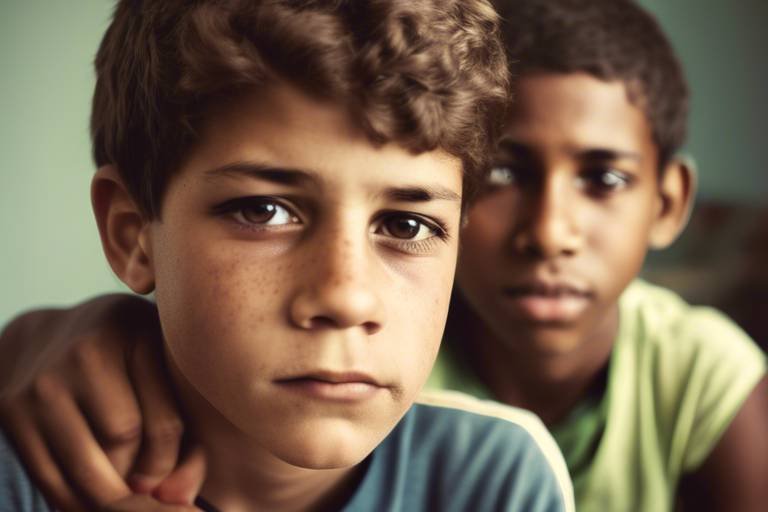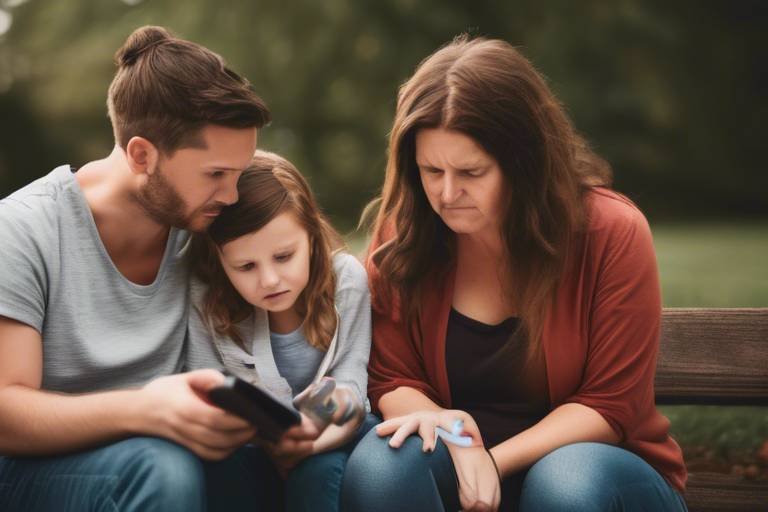Helping Your Child Navigate Early Puberty
As a parent, watching your child grow up can be both a joyous and daunting experience. One of the most challenging phases they may encounter is early puberty. This period, which can begin as early as age 8 for girls and age 9 for boys, is often filled with a whirlwind of changes—both physical and emotional. It’s a time when they might feel like they’re on a rollercoaster, with ups and downs that can leave them feeling confused and overwhelmed. So, how can you, as a parent, help them navigate these turbulent waters?
First off, it's essential to understand that early puberty is not just about physical changes. Yes, they might be growing taller, developing breasts, or experiencing voice changes, but there’s also a significant emotional component. Children may feel a mix of excitement and anxiety as they face these changes. They might wonder, “Why is my body changing?” or “Am I normal?” These questions can lead to feelings of isolation or embarrassment. As a parent, being there to listen and reassure them is crucial.
Moreover, it’s vital to foster an environment where open communication is encouraged. If your child feels comfortable discussing their feelings and experiences, they’re more likely to approach you with their concerns. This means being approachable—putting down your phone, turning off the TV, and really engaging when they talk to you. Sometimes, just a simple check-in can make a world of difference. Ask them how their day was, and be prepared for the unexpected! You might be surprised at what they want to share.
In addition to emotional support, parents should educate themselves about the physical changes their children are experiencing. Understanding what’s happening in their bodies can help you explain these changes to your child in a way that is both age-appropriate and reassuring. For instance, discussing topics like hormonal changes, body hair, and mood swings can demystify the process and help your child feel more in control. Remember, knowledge is power!
Another key aspect is to encourage healthy habits during this time. Children need to learn how to express their feelings in a constructive manner. This could involve journaling, engaging in creative activities, or even participating in sports. Not only do these activities provide an outlet for their emotions, but they also help build resilience. Plus, they can serve as a fantastic way for your child to connect with peers who might be going through similar experiences.
Finally, don’t forget to celebrate the milestones. Early puberty can be a time filled with uncertainty, so acknowledging and celebrating these changes can help your child feel more positive about the transition. Whether it’s a simple acknowledgment of their growing independence or a small celebration of their achievements, these moments can reinforce their self-esteem and help them navigate this phase with confidence.
- What are the signs of early puberty? Early puberty can manifest through physical changes like breast development in girls and voice changes in boys, as well as emotional changes such as increased moodiness.
- How can I support my child emotionally during this time? Open communication is key. Encourage your child to express their feelings and reassure them that it’s normal to feel a mix of emotions.
- What should I do if I’m concerned about my child’s development? Consult with a pediatrician. They can provide guidance and support tailored to your child’s specific needs.

Understanding Early Puberty
Early puberty, often referred to as precocious puberty, is a term that describes the onset of physical and emotional changes in children at a younger age than is typically expected. For girls, this usually means starting before the age of 9, while for boys, it’s generally considered to begin before age 10. The experience can be quite overwhelming, not just for the child, but also for parents who may feel unprepared to navigate this uncharted territory.
So, what exactly happens during early puberty? The signs can vary greatly among children but typically include physical changes such as breast development in girls, testicular enlargement in boys, and the appearance of pubic hair in both. These changes can often lead to feelings of confusion and anxiety as children grapple with their evolving bodies. It’s essential for parents to recognize these signs early on, as they can provide a valuable opportunity for open discussions about what their child is experiencing.
Understanding early puberty also involves recognizing how it differs from typical puberty. While most children enter puberty between the ages of 10 and 14, early puberty accelerates this timeline, which can lead to a myriad of emotional and social challenges. Children may feel out of sync with their peers, who may not yet be experiencing the same changes. This disparity can create feelings of isolation, making it crucial for parents to be proactive in offering support and guidance.
To help parents better understand the differences between early and typical puberty, here’s a simple comparison:
| Aspect | Typical Puberty | Early Puberty |
|---|---|---|
| Onset Age (Girls) | 10-14 years | Before 9 years |
| Onset Age (Boys) | 11-14 years | Before 10 years |
| Physical Changes | Gradual development | Rapid changes |
| Emotional Impact | Standard adjustment | Increased confusion and anxiety |
As parents, it’s essential to approach the topic of early puberty with sensitivity and understanding. Engaging in open conversations can help demystify the changes your child is going through. Encourage questions and provide honest, age-appropriate answers. Remember, your child is likely feeling a mix of excitement and fear, and your support can make a world of difference.
In conclusion, understanding early puberty is the first step in helping your child navigate this challenging phase. By being informed and prepared, you can create a safe space for your child to express their feelings and concerns, ultimately fostering a stronger parent-child bond during this transformative time.

Emotional Changes During Puberty
As children step into the whirlwind of puberty, their emotional landscape undergoes a dramatic transformation. Imagine a roller coaster ride, where the highs are exhilarating and the lows can feel like a free fall. This period is marked by intense feelings, mood swings, and a quest for identity that can leave both children and parents feeling a bit lost. It's essential to understand that these changes are not just typical teenage angst; they are a natural part of growing up and can manifest in various ways.
During early puberty, children may experience a wide range of emotions, from joy and excitement to anxiety and frustration. These fluctuations can sometimes feel overwhelming, making it crucial for parents to be equipped with the right tools to help their children navigate this emotional maze. One moment your child may be bubbling with enthusiasm about a new interest, and the next, they might retreat into their room, overwhelmed by feelings of self-doubt. Recognizing these patterns is vital for fostering a supportive environment.
So, how do you spot these emotional symptoms before they spiral out of control? It's all about being observant and engaged. Look for signs such as:
- Increased irritability or mood swings
- Withdrawal from friends and family
- Changes in sleep patterns or appetite
- Expressions of anxiety or worry about school and friendships
By keeping an eye on these behaviors, you can identify when your child might need a little extra support or understanding. Remember, communication is key! Encourage your child to share their feelings and reassure them that it's okay to feel a bit 'off' sometimes.
Now that you can recognize the signs, how do you support your child's emotional well-being? Start by fostering an environment of open communication. Let your child know that you are there to listen without judgment. Sometimes, just having someone to talk to can make a world of difference. Additionally, consider setting aside regular family time to discuss feelings, experiences, and even challenges. This not only strengthens your bond but also normalizes the process of sharing emotions.
Encouraging your child to express their feelings is equally important. This can be done through various creative outlets such as journaling, art, or even music. For instance, if your child enjoys drawing, suggest they create a piece that represents how they feel. By providing them with tools to articulate their emotions, you empower them to process what they are experiencing. Remember, it’s not just about talking; it’s about finding the right medium that resonates with them.
In summary, the emotional changes during early puberty can feel like navigating uncharted waters. But with patience, understanding, and open lines of communication, you can help your child sail through these turbulent times. After all, every storm eventually passes, and with your support, they will emerge stronger and more resilient.

Identifying Emotional Symptoms
As your child embarks on the rollercoaster ride of early puberty, it's essential to keep a keen eye on their emotional landscape. The changes they undergo can be as bewildering as a sudden thunderstorm on a sunny day. You might notice them swinging from joy to sadness in the blink of an eye, and these mood swings are just the tip of the iceberg. But what exactly should you be looking for? Recognizing the emotional symptoms is crucial for providing the right support.
Common emotional symptoms include:
- Mood Swings: One moment they might be laughing, and the next, they could be in tears. These unpredictable shifts can be confusing, not just for them but for you as well.
- Anxiety: As they grapple with new feelings and changes, anxiety can creep in, manifesting in various ways—like restlessness or excessive worrying.
- Withdrawal: Some children may retreat into their shells, preferring solitude over social interactions. This can be concerning, especially if they were once outgoing.
- Frustration: They may express irritation over small issues, which can be a sign of the internal turmoil they’re experiencing.
It's important to remember that these symptoms can vary widely from one child to another. Some might experience intense emotions, while others may appear more subdued. The key is to remain observant and empathetic. If you notice these signs, try to engage your child in conversation about their feelings. Ask open-ended questions like, "How was your day?" or "What’s been on your mind lately?" This can help create a safe space for them to express themselves.
Additionally, it may be helpful to keep a journal of their emotional fluctuations. You can note down any patterns you observe, which can provide valuable insights into their emotional state. This not only helps you understand them better but also allows you to approach them with more compassion and support.
In conclusion, identifying emotional symptoms during early puberty is not just about spotting mood swings or anxiety; it's about understanding the whirlwind of changes your child is navigating. By staying attuned to their emotional needs, you can provide the guidance they require to sail through this challenging phase.

Supporting Emotional Well-being
As a parent, navigating the emotional landscape of your child's early puberty can feel like walking through a maze. It's important to remember that this is a transformative time for them, filled with new feelings and experiences that can be both exciting and overwhelming. To support your child's emotional well-being, it’s crucial to foster an environment where they feel safe to express their feelings and concerns. Open communication is key; make it a habit to check in with them regularly. Ask open-ended questions like, "How was your day?" or "What’s on your mind?" This encourages them to share their thoughts and feelings without fear of judgment.
Creating a safe space for discussions about their emotions can help your child feel more secure. Sometimes, they might struggle to articulate their feelings, so it can be helpful to use analogies or stories that relate to their experiences. For example, you might say, "You know how a storm can come out of nowhere and shake things up? That’s like how our feelings can change suddenly." This can help them understand that it's normal to feel a whirlwind of emotions during this time.
Additionally, teaching your child healthy coping mechanisms is essential. Encourage them to engage in activities that promote emotional expression, such as journaling or drawing. These creative outlets can serve as a therapeutic release and allow them to process their emotions more effectively. You might also consider introducing mindfulness practices, like meditation or deep breathing exercises, which can help them manage anxiety and stress.
Furthermore, it’s important to validate their feelings. Acknowledge that what they are experiencing is real and significant. Phrases like, "I understand that you're feeling upset, and that’s okay," can go a long way in making them feel heard. Sometimes, simply knowing that their feelings are normal can provide immense comfort. You could even share your own experiences from when you were their age, helping them to see that they are not alone in this journey.
In addition to these strategies, it’s crucial to monitor their emotional health. Look out for signs of distress, such as withdrawal from activities they once enjoyed or changes in sleeping and eating patterns. If you notice any concerning behaviors, don’t hesitate to reach out to a professional. A therapist or counselor can provide additional support and guidance tailored to your child's needs.
Finally, remember that your own emotional well-being is equally important. By taking care of yourself, you’re better equipped to support your child. Engage in self-care activities, seek support from friends or family, and maintain open lines of communication with your child. This mutual support can create a strong foundation for both of you during this transitional phase.
- What are some signs that my child is struggling emotionally during puberty? Look for signs such as increased irritability, withdrawal from social activities, or changes in sleep and appetite.
- How can I encourage my child to talk about their feelings? Create a safe and non-judgmental space for discussions, and ask open-ended questions to facilitate conversation.
- When should I seek professional help for my child? If you notice significant changes in behavior or emotional distress that persists, it may be time to consult a mental health professional.

Encouraging Healthy Expression
Encouraging children to express their feelings in a healthy manner is crucial during the tumultuous phase of early puberty. Think of it as giving them a toolbox filled with essential tools for emotional communication. Just like a carpenter needs the right tools to build a sturdy structure, your child needs the right skills to articulate their emotions. But how can parents create an environment that nurtures this healthy expression? It starts with fostering open communication.
One of the most effective ways to encourage your child to share their feelings is by actively listening. When your child speaks, give them your full attention. This means putting away distractions like your phone or the TV. Make eye contact and nod to show that you understand. By doing so, you create a safe space where they feel valued and heard. You might be surprised at the depth of their thoughts when they realize you genuinely care about what they have to say.
Another strategy is to model emotional expression yourself. Children often learn by observing their parents. If you openly discuss your feelings—whether it’s about a tough day at work or the joy of a family outing—you send a powerful message: it’s okay to talk about emotions. Use phrases like, “I felt really happy when…” or “I was frustrated because…” This not only normalizes emotional expression but also provides them with the vocabulary they need to express their own feelings.
Moreover, you can encourage your child to use creative outlets for expression. Activities such as drawing, writing, or even playing music can serve as powerful tools for them to articulate their emotions. For example, you might suggest they keep a journal where they can write about their day, their feelings, or even their dreams. This not only helps them process their emotions but also provides a safe space to explore their thoughts without judgment.
Additionally, consider introducing them to mindfulness techniques. Practices such as meditation or deep breathing can help children manage overwhelming emotions. You could say, "When you feel anxious or upset, try taking deep breaths. Inhale for four counts, hold for four, and exhale for four." This simple exercise can serve as a grounding technique, helping them to calm down and reflect on their feelings before expressing them.
Lastly, remember that it’s important to validate their feelings. When your child shares their emotions, acknowledge them without judgment. Phrases like, “It’s okay to feel that way,” or “I understand why you’re upset,” can make a world of difference. This validation reassures them that their feelings are normal and that it’s healthy to express them.
In conclusion, encouraging healthy emotional expression in your child during early puberty is vital for their overall emotional well-being. By actively listening, modeling emotional expression, providing creative outlets, introducing mindfulness techniques, and validating their feelings, you empower your child with the skills they need to navigate their emotions confidently. Just like a gardener nurtures a seedling, your support can help your child flourish during this transformative time.
- What are the signs of early puberty? Early puberty may include physical changes such as breast development in girls or testicular enlargement in boys, as well as emotional changes like mood swings and increased sensitivity.
- How can I talk to my child about puberty? Approach the topic with openness and honesty, using age-appropriate language. Encourage questions and provide clear, factual answers to help them understand.
- What if my child is embarrassed to talk about puberty? Create a comfortable environment by discussing puberty during casual moments, like during a car ride or while cooking together, to help ease their embarrassment.
- Are there resources available for parents? Yes, many books and websites provide valuable information on puberty and emotional health. Consider checking out parenting forums or local workshops for additional support.

Physical Changes and Development
When your child enters the realm of early puberty, it can feel like a whirlwind of changes is happening overnight. Suddenly, they are not just your little kid anymore; they are transforming into a young adult at a rapid pace. Physical changes during this period can be surprising, and it’s essential for parents to understand what to expect. These changes typically include growth spurts, development of secondary sexual characteristics, and alterations in body composition. For instance, girls may start developing breasts and begin their menstrual cycles, while boys may experience an increase in muscle mass and the deepening of their voices.
It's important to note that these changes don't happen uniformly. Some children may start showing signs of puberty earlier than others, which can lead to feelings of confusion or even embarrassment. For example, a girl who starts her period at age 9 may feel out of place among her peers who have not yet begun to experience such changes. This disparity can create a sense of isolation, making it crucial for parents to engage in open conversations about these developments. By fostering a supportive environment, you can help your child navigate these changes with confidence.
To better illustrate the physical changes that occur during early puberty, here’s a quick overview:
| Physical Change | Typical Age Range | Notes |
|---|---|---|
| Breast Development | 8-13 years (Girls) | Often the first sign of puberty for girls. |
| Menstrual Cycle Begins | 9-16 years (Girls) | Varies widely; education is key. |
| Growth Spurts | 9-14 years (Girls), 10-16 years (Boys) | Can lead to awkwardness as they adjust to new heights. |
| Voice Deepening | 11-15 years (Boys) | May cause temporary self-consciousness. |
| Body Hair Growth | 9-14 years (Girls), 10-15 years (Boys) | Includes underarm and pubic hair. |
As these changes unfold, it’s essential for parents to maintain an open line of communication. Discussing these physical developments can help demystify the process for your child. Encourage them to ask questions and express any concerns they may have. Remember, they are likely experiencing a mix of excitement and anxiety about these changes, and your support can make a world of difference.
Moreover, it’s crucial to emphasize the importance of body positivity during this transformative phase. Encourage your child to appreciate their body and understand that everyone develops at their own pace. You might say something like, “Every body is unique, and it’s perfectly okay to grow at your own speed.” This reassurance can help your child build a healthy relationship with their body, which is vital during such a turbulent time.
In conclusion, understanding the physical changes that come with early puberty is essential for both parents and children. By staying informed and fostering an open dialogue, you can help your child navigate this challenging yet exciting phase of life with confidence and ease.
- What is the average age for early puberty? Early puberty can start as early as age 8 for girls and age 9 for boys.
- How can I tell if my child is experiencing early puberty? Look for signs such as growth spurts, body hair, and changes in body shape.
- Should I be concerned if my child starts puberty early? While early puberty can be concerning, it is often a natural variation. Consult a healthcare professional if you have specific worries.
- How can I support my child during this time? Open communication, education about changes, and fostering a positive body image are key ways to support your child.

Social Implications of Early Puberty
Entering puberty is like stepping onto a roller coaster—it's thrilling, but it can also be a bit scary, especially when it happens earlier than expected. For many children, early puberty brings about a whirlwind of social implications that can affect their relationships and how they see themselves. Suddenly, they may find themselves navigating a landscape where they feel different from their peers, which can lead to feelings of isolation or anxiety. It's crucial for parents to understand these social challenges so they can provide the necessary support and guidance.
One of the most significant social implications of early puberty is the shift in how children interact with their peers. As their bodies change, they might feel self-conscious or even embarrassed, which can affect their willingness to engage in social activities. This can lead to a reluctance to join in on games or group activities, potentially resulting in feelings of loneliness. Moreover, children who hit puberty early may find themselves in situations where they are treated differently by their peers—sometimes positively, but often negatively. This can create a confusing mix of feelings, as they grapple with both newfound attention and unwanted scrutiny.
Additionally, the emotional maturity that often accompanies puberty doesn't always align with the physical changes. For instance, a child may develop physically but still possess the emotional maturity of their pre-pubescent peers. This mismatch can make it difficult for them to relate to their friends, leading to awkward interactions or misunderstandings. Parents can play a vital role in helping their children navigate these complexities by encouraging open conversations about their feelings and experiences.
Here are some common social challenges children may face during early puberty:
- Peer Pressure: As children grow, they may feel pressured to conform to the behaviors and interests of their peers, which can lead to risky choices.
- Bullying: Those who develop early may become targets for bullying or teasing, which can severely impact their self-esteem.
- Romantic Interests: The emergence of romantic feelings can complicate friendships, leading to confusion and emotional turmoil.
To help their children cope with these challenges, parents should foster an environment of open communication. Encouraging children to talk about their experiences and feelings can help them process the changes they are going through. Additionally, parents can assist their children in developing social skills that promote healthy relationships. Activities such as role-playing different social scenarios can provide children with the tools they need to navigate complex interactions with confidence.
It's also essential for parents to instill a sense of self-acceptance in their children. Helping them understand that everyone develops at their own pace can alleviate some of the pressures they may feel. Celebrating their unique qualities and encouraging them to embrace their individuality can go a long way in building their self-esteem. Remember, it's not just about physical changes; it's about nurturing their emotional and social well-being too.
In conclusion, while early puberty can present various social challenges, it also offers an opportunity for growth and understanding. By being proactive and engaged, parents can help their children navigate this often tumultuous period, ensuring they emerge with a strong sense of self and the ability to form meaningful connections with others.
Q: What should I do if my child is being bullied because of early puberty?
A: It's essential to address bullying immediately. Talk to your child about their experiences and encourage them to speak to a trusted adult at school. Together, you can work on strategies to handle the situation and ensure their safety.
Q: How can I help my child build friendships during this time?
A: Encourage your child to engage in group activities or clubs that align with their interests. This can help them connect with peers who share similar passions, making it easier to form friendships.
Q: What if my child feels embarrassed about their changes?
A: Open communication is key. Reassure your child that what they're experiencing is normal and that it's okay to feel confused or embarrassed. Sharing your own experiences can help them feel less alone.

Managing Peer Relationships
As children transition through the whirlwind of early puberty, managing peer relationships can feel like walking a tightrope. Suddenly, the dynamics of friendships shift dramatically. Kids who once played together without a care may now find themselves navigating the choppy waters of social expectations, peer pressure, and changing interests. So, how can parents help their children maintain and build positive friendships during this tumultuous phase? Well, it all starts with understanding the emotional landscape.
First and foremost, it's essential to recognize that children going through early puberty are often more sensitive to social cues. They may experience heightened feelings of insecurity or anxiety, which can impact how they interact with their peers. For instance, a simple comment from a friend can feel like a major critique. This is where your role as a parent becomes crucial. Open conversations about these feelings can help your child feel understood and supported. Ask them about their friendships, listen actively, and provide a safe space for them to express their thoughts.
Additionally, encouraging your child to engage in group activities can be a fantastic way to foster friendships. Whether it's joining a sports team, participating in a club, or attending community events, these settings provide opportunities for children to connect with peers who share similar interests. This not only helps them build new friendships but also reinforces the idea that they are not alone in their experiences. Here are a few tips to help your child manage peer relationships:
- Encourage Empathy: Teach your child to understand and respect others' feelings. This can help them build stronger and more meaningful connections.
- Promote Open Communication: Make it clear that they can come to you with any friendship issues. This will help them feel more secure in addressing conflicts.
- Model Healthy Relationships: Show them what healthy friendships look like through your own relationships. Children often learn by example.
Moreover, it's vital to discuss the concept of peer pressure. As they grow, children may encounter situations where friends might encourage them to act against their values or comfort zones. Equip your child with strategies to say no and reinforce the importance of staying true to themselves. Role-playing different scenarios can be a fun and effective way to prepare them for real-life situations.
Lastly, remind your child that it's perfectly normal to experience ups and downs in friendships. Not every relationship will last forever, and that’s okay. Teach them resilience and the ability to move on from friendships that are no longer healthy or fulfilling. By providing guidance and support, you can help your child navigate the complex world of peer relationships during early puberty, ensuring they emerge with strong social skills and lasting friendships.
Q: How can I tell if my child is struggling with friendships?
A: Look for signs such as withdrawal from social activities, changes in mood, or expressing feelings of loneliness. Open communication is key, so encourage your child to share their feelings with you.
Q: What should I do if my child is experiencing bullying?
A: Take any reports of bullying seriously. Encourage your child to talk about their experiences, and work together to find solutions, which may include speaking with school officials or seeking professional help.
Q: How can I help my child cope with peer pressure?
A: Discuss the concept of peer pressure openly. Role-playing scenarios can be effective in preparing them to handle such situations. Reinforce the importance of making their own choices and staying true to their values.

Building Self-Esteem
As your child navigates the tumultuous waters of early puberty, one of the most significant challenges they may face is a dip in self-esteem. This phase of life is often marked by awkward physical changes and heightened social awareness, which can lead to feelings of insecurity. It's crucial for parents to understand that self-esteem is not just a fleeting feeling; it’s a fundamental aspect of a child's overall well-being and development.
So, how can you, as a parent, help your child build and maintain a strong sense of self-worth during this transformative time? First and foremost, it's essential to foster an environment where your child feels safe and valued. Praise them for their efforts rather than just the outcomes. For instance, if they tried hard in a school project but didn't achieve the top grade, acknowledge their hard work and creativity. This approach helps them understand that their worth isn't solely tied to success but also to their dedication and perseverance.
Additionally, encouraging your child to engage in activities they enjoy can significantly boost their self-esteem. Whether it's sports, art, music, or any hobby, participating in these activities allows them to express themselves and develop new skills. As they excel in these areas, they’ll gain confidence that can spill over into other aspects of their lives. Don't forget to celebrate their achievements, no matter how small! Each milestone is a building block for their self-image.
Another effective strategy is to teach your child about the importance of positive self-talk. Children often internalize negative messages they hear from peers or even from themselves. Help them recognize when they're being overly critical and guide them to reframe those thoughts. For example, instead of saying, “I’m terrible at this,” encourage them to say, “I’m learning and improving every day.” This shift in mindset can have a profound impact on their self-esteem.
It's also vital to discuss the concept of individuality with your child. Remind them that everyone develops at their own pace and that differences are what make each person unique. You might even share your own experiences with puberty and self-esteem struggles to show them that they are not alone in their feelings. This can create a strong bond and open the door for honest conversations about their experiences and emotions.
Moreover, fostering healthy friendships is crucial during this period. Encourage your child to surround themselves with supportive peers who uplift them rather than bring them down. You can help by facilitating playdates or group activities where they can build these positive relationships. A strong support system can help them navigate the ups and downs of early puberty with greater resilience.
Lastly, consider introducing them to resources that promote self-esteem. Books, podcasts, or even workshops geared towards young adolescents can provide them with tools and strategies to enhance their self-image. The more equipped they feel, the better they can handle the challenges that come their way.
In conclusion, building self-esteem during early puberty is an ongoing process that requires patience, understanding, and active involvement from parents. By creating a nurturing environment, celebrating achievements, promoting positive self-talk, and encouraging healthy relationships, you can help your child develop a robust sense of self-worth that will carry them through not just this phase, but throughout their lives.
- What are some signs that my child is struggling with self-esteem? Look for changes in behavior, such as withdrawal from activities they once enjoyed, increased sensitivity to criticism, or negative self-talk.
- How can I support my child if they feel left out or bullied? Encourage open communication, listen to their feelings, and help them develop strategies to address the situation, such as seeking support from trusted adults or friends.
- Are there specific activities that can boost self-esteem? Yes! Activities such as sports, arts and crafts, or volunteering can help children feel accomplished and valued.
- How important is parental involvement in building self-esteem? Extremely important! Your support, encouragement, and understanding play a critical role in shaping your child's self-image.
Frequently Asked Questions
- What is early puberty?
Early puberty is when a child begins to show physical and emotional signs of puberty at a younger age than usual. Typically, this occurs before age 9 in boys and before age 8 in girls. Understanding this early onset can help parents provide the right support.
- What are the common signs of early puberty?
Common signs include physical changes such as breast development in girls, testicular enlargement in boys, and the onset of menstruation. Emotional changes like mood swings, increased anxiety, and changes in behavior are also prevalent during this stage.
- How can I support my child emotionally during this time?
Open communication is key! Encourage your child to talk about their feelings and reassure them that what they're experiencing is normal. Listening without judgment and validating their feelings can significantly help them navigate this emotional rollercoaster.
- What should I do if I notice mood swings or anxiety?
If you notice these symptoms, it’s essential to create a safe space for your child to express themselves. Consider discussing their feelings together and, if necessary, consult a professional for further guidance and support.
- How can I help my child with the physical changes they are experiencing?
Discuss the physical changes openly and honestly. Use age-appropriate language to explain what’s happening to their bodies. This can help reduce confusion and embarrassment, making them feel more comfortable in their skin.
- What social challenges might my child face during early puberty?
Children may face challenges like peer pressure, bullying, or feeling different from their friends. They might also struggle with self-esteem issues as they compare themselves to others. Being there to listen and provide guidance can make a big difference.
- How can I help my child build self-esteem during this period?
Encourage your child to engage in activities they enjoy and excel at. Celebrate their achievements, no matter how small, and remind them of their unique qualities. Positive reinforcement can help them develop a healthy self-image.
- Is it normal for my child to feel embarrassed about their changes?
Absolutely! Feeling embarrassed is a common reaction during puberty. Encourage your child to talk about these feelings, and remind them that everyone goes through similar changes. This can help normalize their experiences.
- When should I seek professional help for my child?
If your child is struggling significantly with emotional changes or if their physical development seems concerning, it’s wise to consult a healthcare professional. They can provide additional resources and support tailored to your child's needs.



















